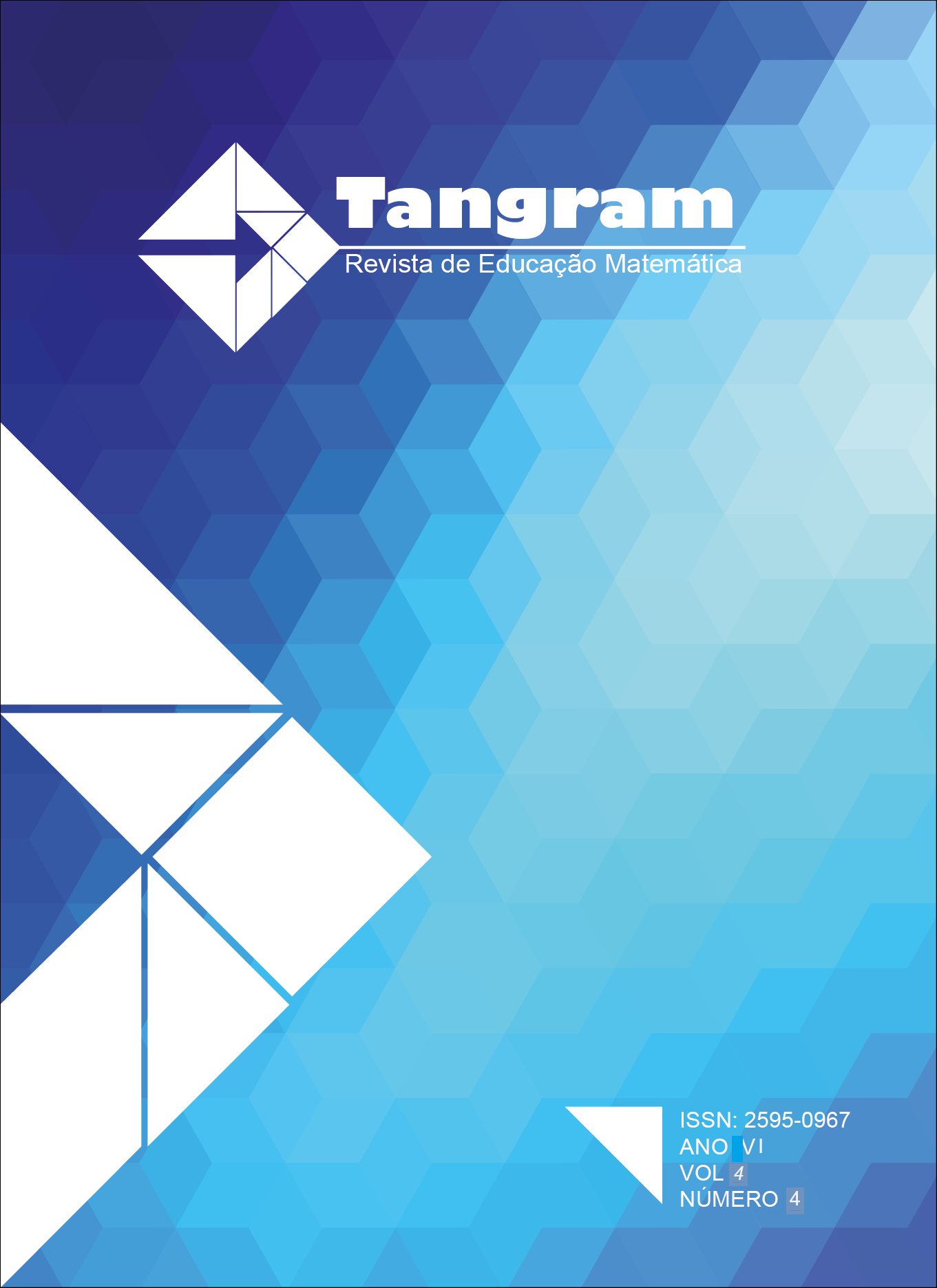A Educação Matemática nos anos iniciais: a modelagem como metodologia
DOI:
https://doi.org/10.30612/tangram.v6i4.17446Keywords:
Methodology, Modeling, PedagoguesAbstract
The search for new methodologies for teaching Mathematics in the first years of Elementary School has become more fabulous in the last two decades. This fact is due to the discussion about the improvement of the so-called “quality” of the teaching of Mathematics offered, as well as the training of the pedagogue teacher, responsible for this teaching in Basic Education. Thus, assuming as a context a continuing education course with pedagogical teachers, this article aims to present a hermeneutic-phenomenological study about Mathematical Modeling (MM) understood as a teaching methodology, investigating what would be the concepts expressed in the speeches given while carrying out a continuing education course. For that, three of the participating teachers' speeches were analyzed, and their activities were sent to the virtual environment. As a result, it was noticed that two of the three teachers understood the MM as a methodology, discussing them pedagogically, in addition to the understanding of the methodological continuity that the Mathematics teaching process must present in the first years of Elementary School.
Downloads
References
Almeida, L. M. W. de, Silva, K. P. da, & Vertuan, R. E. (2012). Modelagem Matemática na Educação Básica. São Paulo: Contexto.
Alvesson, M. & Sköldeberg, K. (2009). Reflexive Methodology: new vistas for qualitative research. Londres: Sage publications.
Barbosa, J. C. (2001). Modelagem Matemática: Concepções e Experiências de Futuros Professores, (Tese de Doutorado) – UNESP - Rio Claro. Disponível em: https://www.periodicos.rc.biblioteca.unesp.br/index.php/bolema/article/view/10522/6931. Acesso em: 20 Mai. 2023.
Bassanezi, R. C. (2015). Ensino-aprendizagem com modelagem matemática. 3 ed. São Paulo: Contexto.
Burak, D. (2004). Modelagem Matemática e a sala de aula. In: Encontro Paranaense de Modelagem Em Educação Matemática, 01, 2004, Londrina. Anais. Londrina: UEL, 2004, p. 1-10.
Mometti, C. (2022). Trilha Metodológica Maker-Science: proposição de uma metodologia para o Ensino de Ciências. Revista Insignare Scientia - RIS, 5(4), 420-435. https://doi.org/10.36661/2595-4520.2022v5n4.12884. Acesso em: 20 Mai. 2023.
Mometti, C. (2023). Hermeneutic-phenomenological study of the teaching practice of polyvalent teachers. Revista Internacional De Pesquisa Em Educação Matemática, 13(1), 1-16. https://doi.org/10.37001/ripem.v13i1.3360. Acesso em: 20 Mai. 2023.
Pires, M. N. M; Silva, K. A. P. da & Gomes, J. C. S. (2021). Formação de Professoras dos Anos Iniciais em Modelagem Matemática. Sisyphus - Journal of Education, vol. 9, núm. 2, 2021, Julho-Outubro, pp. 154-180. Instituto de Educação da Universidade de Lisboa. Disponível em: https://www.redalyc.org/journal/5757/575769046008/html/. Acesso em: 20 Mai. 2023.
Rosa, C. C. (2019). Modelagem Matemática e Formação de Professores: um diálogo entre ensinar e aprender. Perspectivas da Educação Matemática, v. 11, n. 26, 28 fev. 2019. Disponível em: https://periodicos.ufms.br/index.php/pedmat/article/view/6614/5495. Acesso em: 24 Jun. 2023.
Schrenk, M. J., & Vertuan, R. E. (2022). Modelagem Matemática como prática pedagógica: uma possível caracterização em Educação Matemática. Revista Educação Matemática Pesquisa, 24(1), 194-224. https://doi.org/10.23925/1983-3156.2022v24i1p194-224. Acesso em: 20 Mai. 2023.
Silva, V. Da S. & Burak, D. (2018). A Formação Matemática no curso de Pedagogia: aprendizagens a partir da modelagem matemática. Cadernos de Pesquisa, São Luís, v. 24, n. esp., p. 159–175, 2018. DOI: 10.18764/2178-2229.v24n.especialp159-175. Disponível em: http://periodicoseletronicos.ufma.br/index.php/cadernosdepesquisa/article/view/8075. Acesso em: 14 Mai. 2023.
Souza, D. C. de; Silva, A. A. C. da & Rosa, C. C. da. (2019). Modelagem Matemática: uma possibilidade para o Ensino de Matemática nos cursos de Pedagogia. Revista Ensin@ UFMS, v. 1, n. 4, p. 73-91, 31 dez. 2019. Disponível em: https://periodicos.ufms.br/index.php/anacptl/article/view/10448. Acesso em: 23 Mai. 2023.
Tardif, M. (2012). Saberes docentes e formação profissional. 13. ed. Petrópolis: Vozes.
Yin, Robert K. (2015). Case study research: design and methods. 3 ed. California: Sage publications.
Zabala, A. (1999). Didática e a Prática Educativa. 1 ed. Porto Alegre: Artmed editora.
Downloads
Published
How to Cite
Issue
Section
License

This work is licensed under a Creative Commons Attribution-NonCommercial-ShareAlike 3.0 Unported License.
Authors must accept the publication rules when submitting the journal, as well as agree to the following terms:
(a) The Editorial Board reserves the right to make changes to the Portuguese language in the originals to maintain the cultured standard of the language, while respecting the style of the authors.
(b) Authors retain the copyright and grant the journal the right to first publication, with the work simultaneously licensed under the Attribution-NonCommercial-ShareAlike 3.0 Brazil (CC BY-NC-SA 3.0 BR) that allows: Share - copy and redistribute the material in any medium or format and Adapt - remix, transform, and create from the material. CC BY-NC-SA 3.0 BR considers the following terms:
- Attribution - You must give the appropriate credit, provide a link to the license and indicate whether changes have been made. You must do so under any reasonable circumstances, but in no way that would suggest that the licensor supports you or your use.
- NonCommercial - You may not use the material for commercial purposes.
- Sharing - If you remix, transform, or create from material, you must distribute your contributions under the same license as the original.
- No additional restrictions - You may not apply legal terms or technological measures that legally restrict others from doing anything that the license permits.
(c) After publication, authors are allowed and encouraged to publish and distribute their work online - in institutional repositories, personal page, social network or other scientific dissemination sites, as long as the publication is not for commercial purposes.






